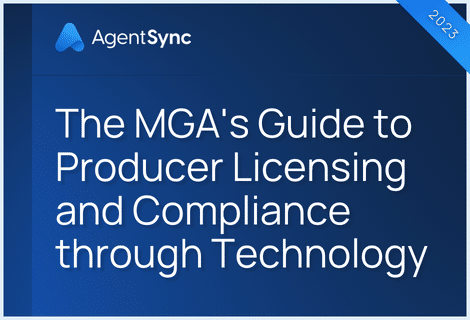

In the neverending alphabet soup that is the insurance industry, two important terms beg for distinction. Managing general agency/managing general agent (MGA) and managing general underwriter (MGU) – these two terms frequently spur confusion in the industry, even by those who profess to be one or the other.
So, what are the differences? What is an MGU anyway? How about an MGA? Agency or underwriter, how much does it matter?
What is an MGA in insurance?
An MGA is a special type of insurance agency/agent or brokerage that is given more authority than a typical agent. MGA and MGU responsibilities include tasks typically carried out by insurers such as binding coverage, underwriting, settling claims, and negotiating contracts.
MGA vs. MGU: What’s the difference?
Long story short, there are no key differences. Some MGAs or MGUs are set up to handle claims, and some terms are more common to different lines of authority, but there is no standard distinction.
Also, to prove that even total insurance industry wonks are a little muddled on the MGA vs. MGU discourse, you may be interested to know the NAIC drafters considered naming the MGA Act the MGU Act because of the synchronicity of managing general underwriter, but ultimately “MGA” Act held out because the term MGA had broader use. True story.
Insurance MGA definition competes with MGU definition
While many industry thinkpieces throw an aside about there being “just a few key distinctions” between MGAs and MGUs, we have yet to encounter any sources that elaborate on what those key distinctions are.
Some sources allude to the idea that one type of managing general something-or-other handles underwriting and claims (see here, here, or here). Although, as you’ll read if you check out those sources, some attribute claims handling to MGAs while others attribute it as exclusive to MGUs, which is hardly useful.
Other sources (such as this one or this one) help out by saying MGU is a term more common to companies working in the life and health insurance business, while property and casualty insurance businesses are more likely to use MGA.
Both these so-called distinctions still leave readers asking, what is the difference between an MGA and MGU in insurance?
The answer we come away with is: There isn’t a difference. MGA or MGU, they both denote the same kind of business. To truly be an MGA or MGU, you must serve as an insurance agent or broker and, most importantly, you have the authority to underwrite insurance contracts on behalf of a carrier or carriers
How to know if you are an MGA
As we’ve covered in our post on Understanding the MGA Act, the 2002 NAIC model legislation regulating MGAs is the best place to figure out whether you are an MGA/MGU. Because many agencies that consider themselves MGAs have found they are, in fact, not, the NAIC’s MGA Act is helpful and clear in saying that, regardless of what you call yourself, what matters is how you are regulated.
Your organization will be held to an MGA standard if you aren’t an employee of, manager for, underwriter on behalf of, or attorney for an insurer AND you are handling the total insurance business including underwriting as a separate entity, responsible for reinsurance, pay out claims for cases larger than $10,000, and produce and underwrite at least 5 percent of the policyholder surplus.
Clear as mud, right?
Basically, as far as an insurance MGA definition, if your organization is not legally part of the insurer, but you work with them in a way that puts you on the hook for underwriting and paying out insurance contracts, you might be an MGA. If, however, you don’t handle underwriting or claims paying or overlap with carrier duties, then you may actually be a brokerage general agency, or BGA.
Where do MGAs work within the distribution channel?
Like agencies, MGAs/MGUs fall somewhat in the middle of the insurance distribution channel. MGAs typically work with insurers to formulate products that they then deliver to agents or directly to insureds. They can also be responsible for communicating with clients and attending to their needs.
To engage the brain a little differently, close your eyes and imagine a two-circle Venn diagram. If one circle is a list of carrier responsibilities and the other circle is agency responsibilities, that marquise-shaped middle of overlap, where underwriting and recruiting downstream sales funnels live, that is where MGAs are in the insurance distribution channel.
History of the insurance MGA/MGU
An MGA in insurance (or MGU or whatever you’d like to call them) arose as a downstream result of the westward expansion. As businesses and commerce connected the East and West Coasts, insurance giants traditionally located in the Northeast looked to expand their business services across the continent. The Industrial Revolution and surges forward in communication technology enabled more collaboration with western states, as well.
However, most insurers weren’t interested in setting up shop with fully equipped physical locations or brand new ventures – building a brand new insurance company and keeping cash reserves on hand is not cheap. Instead, insurers developed MGAs/ MGUs, organizations that could build insurance policies specific to a region or even to a specific demographic.
Of course, as MGAs formalized and became more common, they somewhat became a Petri dish of insurance, a place to try out new policies and product types. Some MGAs were less than scrupulous about their reinsurance requirements, and found themselves under a regulatory microscope as a result. Yet, being a Petri dish of insurance also has massive benefits – many innovations of the last century were made because of the freedom of MGAs’ underwriting.
Current use case of MGA/MGU
MGAs and MGUs now fill two roles, one of specialization and one as the ongoing Petri dish.
While general life insurance, health insurance, property and casualty insurance, etc. may be obtained from a carrier, the carriers often have MGAs and MGUs fill the roles for more specialized insurance needs.
Consumers may not be aware of it, but frequently those who are looking for particular niche insurance are working with MGAs that can underwrite for the very specific risks of a circumstance or situation. For example, if you run a golf business, having a general liability policy isn’t going to cut it. And you certainly don’t want to deal with a full auto policy on your fleet of golf carts.
You’re more likely to have to deal with repairing and replacing motors from a cart rolling into a pond as opposed to worrying about the hazards of the open road. If you contact a carrier, they’ll likely refer you to an MGA partner that works exclusively with golf courses, so you can get coverage – and underwriting – that is most appropriate for your business.
That MGA may have various coverage options that are backed by a few different carriers. The point is the MGA’s particular experiences and niche specialty allows it to underwrite a policy tailored to your needs as opposed to you buying an expansive policy that covers a lot of unnecessary situations.
How do insurance companies benefit from working with an MGA?
MGAs can actually bring a lot of benefit to the agencies that work with them. One of the biggest being the access that working with an MGA can provide. Changing risk appetites and underwriting guidelines mean most agencies are limited in the number of carrier appointments they can secure. An MGA helps by broadening an agency’s reach to specialty insurers the agency may not have otherwise been able to reach.
On top of expanding your reach, MGAs can provide various other benefits to an insurance agency including sales and marketing support as well as the advantage of online platforms and automated solutions and tools that can help streamline things like claims processing and renewals. Overall, MGAs can offer agencies the support they need to stay on top of industry challenges and remain competitive.
How MGAs foster technological innovation in the insurance industry
MGAs and their smaller sizes and personalized underwriting teams still allow them to be places of experimentation, as well. In fact, even as regulations have reigned in some of the riskier MGA practices that caused consternation in the industry in the 1980s, MGAs are on the rise. In fact, one organization that exclusively studies that segment of the insurance market says the number of MGAs in insurance has nearly doubled since 2012 alone.
This aggressive growth and speedy activity of startups, mergers and acquisitions play into their heavy influence in insurtech. While MGAs have long been places of innovation for insurance policies and distinctive insurance underwriting, they are also a great place of enterprise for digital processes and new technologies.
How can insurance MGAs benefit from technology?
As is the case with most of the insurance industry’s key players, MGAs that leverage modern technology solutions will reap some pretty mighty benefits. By integrating these automated solutions into everyday workflows, MGAs could see:
- Quicker and more efficient operations
- Reduced risk
- Reduced costs
- Rapid growth, not at the expense of compliance
- Improved producer and employee experience
As those new technologies evolve, inevitably, so too will the role of MGAs and MGUs in the insurance distribution pipeline. Here’s to the next generation of an ever-evolving industry.
Beef up your MGA compliance tools; check out how AgentSync can help.
MGA FAQs
How do I know if an MGA/MGU handles claims?
This varies from business to business, and will depend on what is spelled out in the terms of that organization’s contract with its carrier(s).
Can an MGA/MGU underwrite for products of multiple carriers?
Yes. An MGA/MGU can underwrite for products of multiple carriers.
If an MGA contracts with a carrier to sell that carrier’s products, but doesn’t underwrite those products, is it actually an MGA?
Maybe. An organization could act in an MGA capacity in a relationship with one or more carriers while also acting in an agency capacity with others. For instance, XYZ MGA could underwrite and sell private swimming pool insurance for MegaCorp Carrier, but also subcontract a bunch of agents to sell GigaCorp Carrier’s home insurance contracts.

